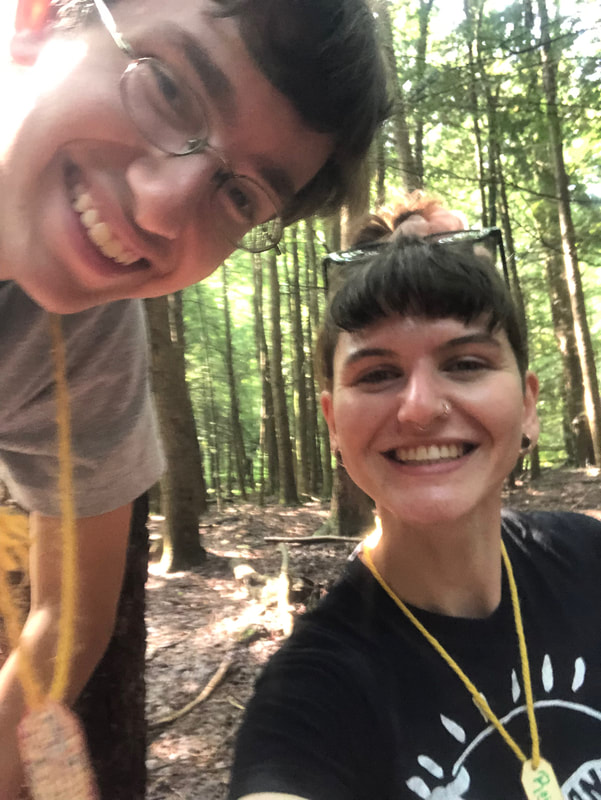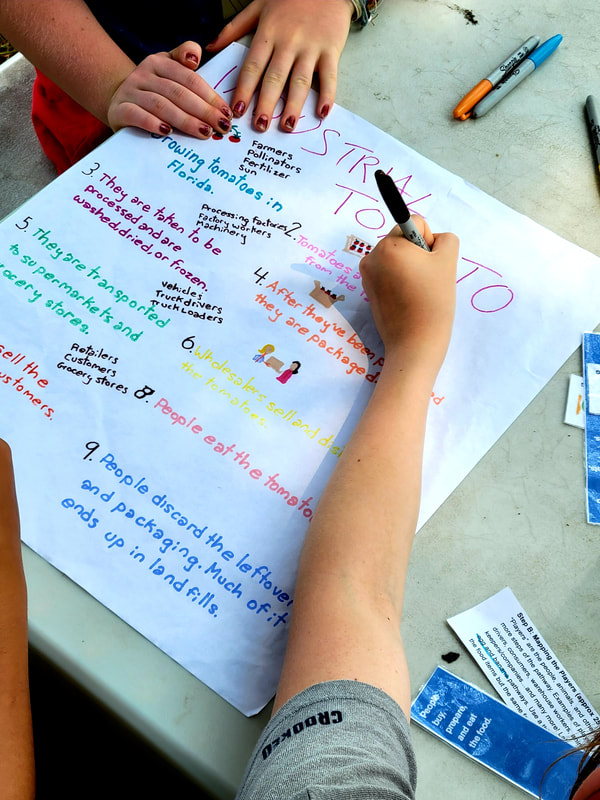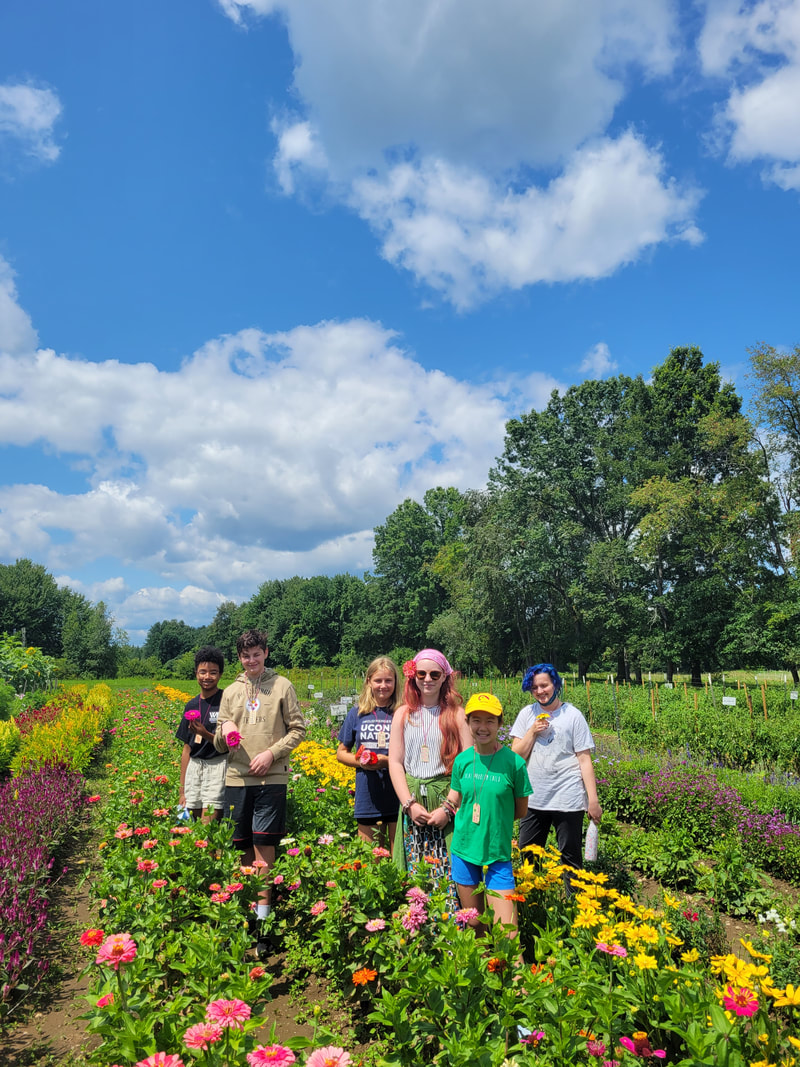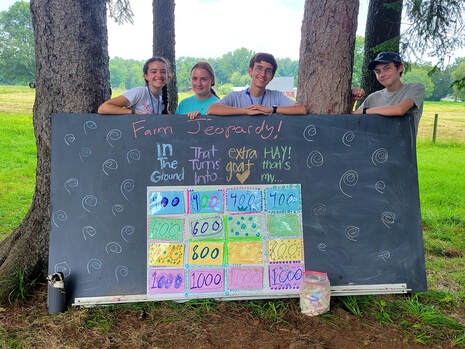Food Systems & Leadership Training for Teens
Farm and Garden Camp offers successive opportunities for teens to become staff members at camp by building farm and garden skills, developing teaching and facilitation skills with children, and learning to serve as leaders in their communities. Participants develop the competence and confidence they need to be successful leaders at camp and anywhere else they pursue their passions and interests.
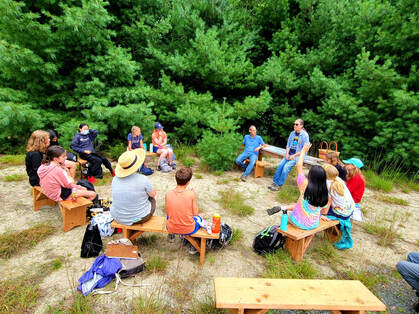 Field trip to Wissatinnewag Gardens with the Nolumbeka Project
Field trip to Wissatinnewag Gardens with the Nolumbeka Project
Jr. CITs (7th-9th graders)
Program Description
Jr. CITs explore complex topics related to food systems, community building, wellness, and leadership through workshops, hands-on time with the animals, work projects in the garden and farm fields, craft projects, and independent and small group projects. Jr. CITs spend a large amount of time with their peers and have special opportunities to buddy up with younger campers for projects, meals, and stories. Field trips and/or special guests add depth and breadth to the Jr. CIT experience. Programming for each session will alternate each week so that if youth attend 2 consecutive weeks they will not repeat content.
Jr. CIT SESSIONS ARE ONE WEEK LONG. The program costs $415 per one-week session. There is a $75 discount when registering for 2 sessions. Jr. CITs may attend one or two week-long sessions per summer.
Jr. CIT session 1A: July 8-12
Jr. CIT session 2B: July 15-19
Jr. CIT session 3A: July 22-26
Jr. CIT session 4B: July 29-August 2
Jr. CIT session 5A: August 5-9
Jr. CIT session 6B: August 12-16
Content alternates each week. It is recommended that youth attend on alternate weeks so that they do not repeat content (i.e. register for sessions 5A and 6B not 3A and 5A.)
Themes and overarching questions include:
Program Description
Jr. CITs explore complex topics related to food systems, community building, wellness, and leadership through workshops, hands-on time with the animals, work projects in the garden and farm fields, craft projects, and independent and small group projects. Jr. CITs spend a large amount of time with their peers and have special opportunities to buddy up with younger campers for projects, meals, and stories. Field trips and/or special guests add depth and breadth to the Jr. CIT experience. Programming for each session will alternate each week so that if youth attend 2 consecutive weeks they will not repeat content.
Jr. CIT SESSIONS ARE ONE WEEK LONG. The program costs $415 per one-week session. There is a $75 discount when registering for 2 sessions. Jr. CITs may attend one or two week-long sessions per summer.
Jr. CIT session 1A: July 8-12
Jr. CIT session 2B: July 15-19
Jr. CIT session 3A: July 22-26
Jr. CIT session 4B: July 29-August 2
Jr. CIT session 5A: August 5-9
Jr. CIT session 6B: August 12-16
Content alternates each week. It is recommended that youth attend on alternate weeks so that they do not repeat content (i.e. register for sessions 5A and 6B not 3A and 5A.)
Themes and overarching questions include:
- Food Systems Advocacy – What values underlie different types of food systems? What opportunities and harms arise with these different systems? What food-related issues, needs, and policy agendas are currently alive in our own communities?
- Ancestry & Kinship – How does knowing where we come from influence our relationships with land and food? How do people who have lived in and stewarded this place for thousands of years relate to land and food? What are our relational responsibilities when it comes to land and food?
- Wellness & Self-Care – How does growing, harvesting, and preparing food contribute to my mental and physical health? How do I help the land and how does the land help me? How can learning to listen to the land help me learn to listen to myself and to others? How can we take care of each other?
CITs (Counselors-In-Training, 10th-12th grades or age 15+)
Program Description:
CITs participate in a four-week program focusing on counselor skill development. The first two weeks include a series of workshops on counseling skills as well as time with campers. The second two weeks are spent with camper groups to apply learning and practice skills. Opportunities for 1-on-1 and group check-ins are included throughout the entire program. CITs participate in a self-reflexive evaluation process with the CIT Instructor at the end of their time at camp. The training weeks occur during the second two weeks of camp; CITs may select any other sessions during the summer to complete their two practice weeks.
Program Description:
CITs participate in a four-week program focusing on counselor skill development. The first two weeks include a series of workshops on counseling skills as well as time with campers. The second two weeks are spent with camper groups to apply learning and practice skills. Opportunities for 1-on-1 and group check-ins are included throughout the entire program. CITs participate in a self-reflexive evaluation process with the CIT Instructor at the end of their time at camp. The training weeks occur during the second two weeks of camp; CITs may select any other sessions during the summer to complete their two practice weeks.
|
Topics Covered In Training Weeks:
~ Child Development ~ Stages of Group Development ~ Behavior & Conflict ~ Leadership ~ Using Your Voice ~ Leading Games ~ Accessibility & Neurodiversity ~ Nervous System Regulation ~ Activity Planning, Implementation & Evaluation ~ Giving and Receiving Feedback ~ Time Management and Organizational Strategies ~ and more! |
Assistant Instructors (11th grade and older or age 16+)
Program Description:
Teens who have demonstrated skill, commitment, camp knowledge, and maturity in the CIT program are eligible to work as Assistance Instructors. Assistant Instructors are ready to take the next step towards becoming Instructors by serving as paid stewards of campers, animals, and plants on the farm. Assistant Instructors receive mentorship from the Core Team as well as other staff to develop in the following areas:
For more information, see the Staff Hiring Page or read the full job description here.
Program Description:
Teens who have demonstrated skill, commitment, camp knowledge, and maturity in the CIT program are eligible to work as Assistance Instructors. Assistant Instructors are ready to take the next step towards becoming Instructors by serving as paid stewards of campers, animals, and plants on the farm. Assistant Instructors receive mentorship from the Core Team as well as other staff to develop in the following areas:
- Knowledge about camp routines and infrastructure, and animal/plant health and care;
- Skills with farm tools, plant identification, animal handling, communication with staff, teaching campers;
- Awareness of camp operations and safety.
For more information, see the Staff Hiring Page or read the full job description here.

